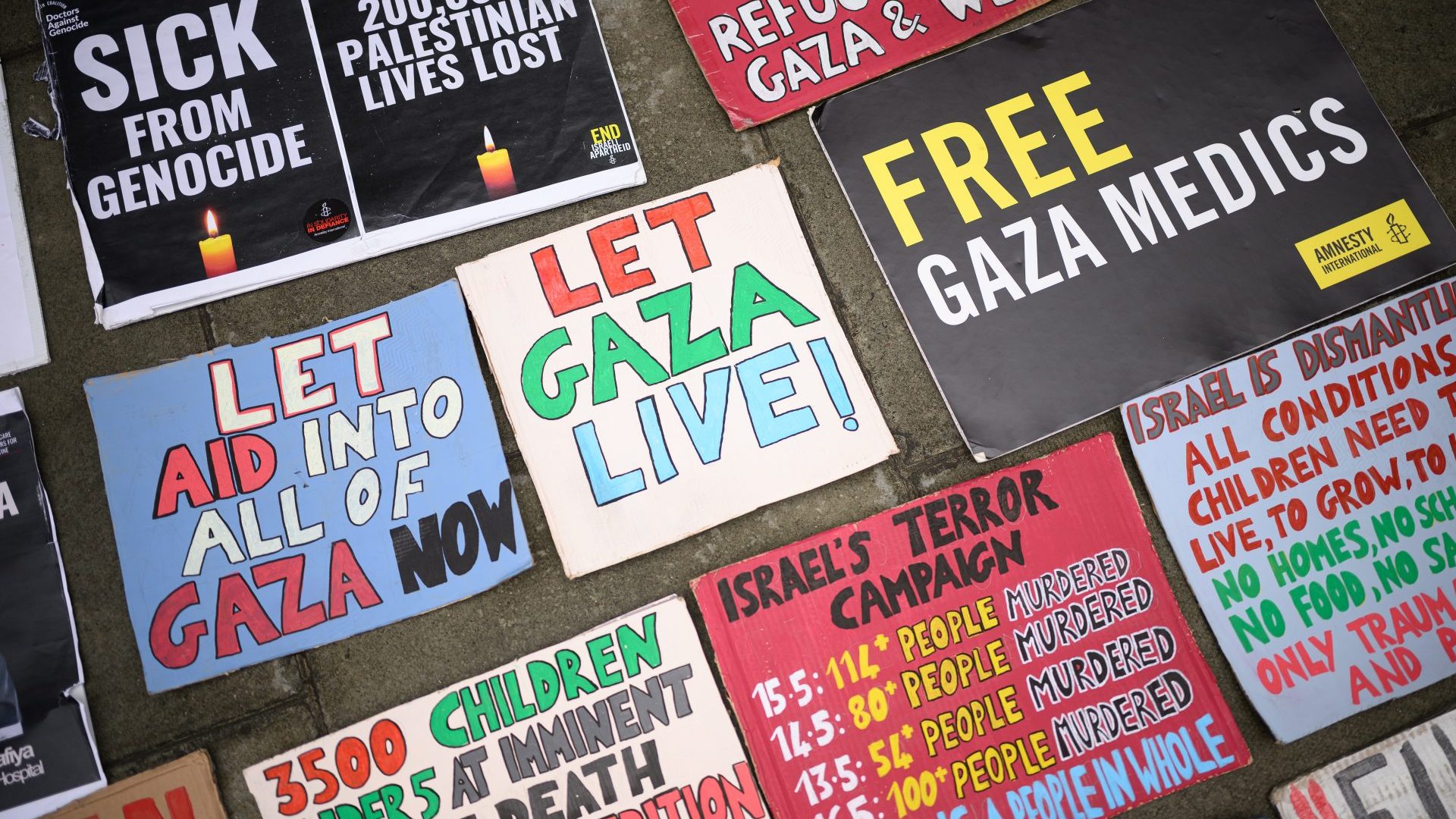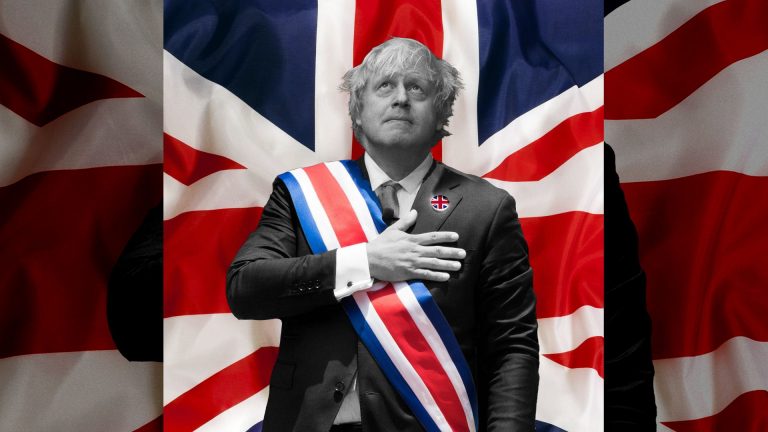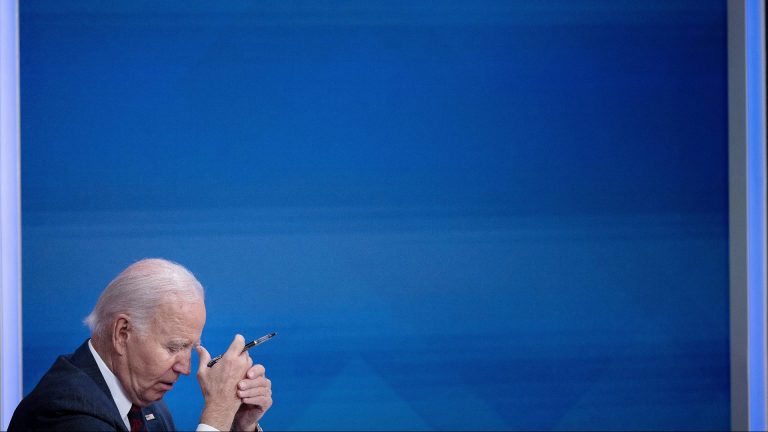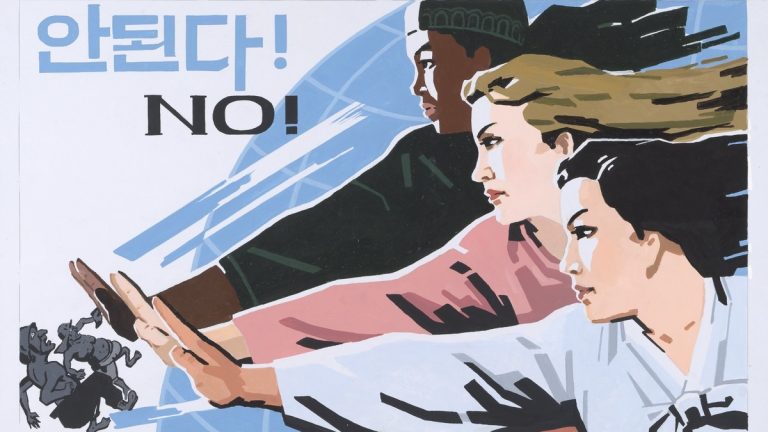On a sun-kissed day in central London, I went on what certain commentators and politicians would call a hate march. With the Thames to their left and the Palace of Westminster up ahead, thousands of people from all over the country were streaming across Hungerford Bridge to protest against bloodshed in a foreign land; to boo the Israeli government and to cheer Gaza.
There were half a million there, said the organisers. The Met Police said it was more like 20,000. As has been the fashion for 18 months now, the marchers raised banners with the words “genocide” and “apartheid’. There were drums, megaphones, chants. Hearing the controversial chant “from the river to the sea”, for a moment I wondered if we were marching all the way to Southend.
I’d never attended a demonstration in support of Palestine before, which has made me hesitant when speculating about what goes on during these demonstrations. Other people in the worlds of media and politics seem much happier to speculate on the motives of these protestors, even though they have never met them.
As a result, the idea that these gatherings are “hate marches” has been allowed to take hold. So has the claim that Jewish locals and tourists are afraid to come into central London on a Saturday.
I had no idea whether this was actually true – but then I went along and met plenty of Jewish groups and Jewish people who clearly didn’t believe themselves to be in mortal danger. In the shadow of the Ministry of Defence, I saw banners representing: Jews For Justice For Palestinians; the International Jewish Anti-Zionist Network; the Jewish Voice For Labour; Holocaust Descendants Against Gaza Genocide!; the Jewish Socialist Group, and more. With visible solidarity, unaffiliated demonstrators carrying cardboard signs identifying themselves as Jews walked in smaller groups, in pairs, and in some cases alone.
One was Kate, an adopted Londoner from New York City. “I’ve been on about four or five of these things,” she told me. “I often come with a Muslim friend and with people from very different backgrounds, including a rabbi and other Jewish friends and acquaintances. Very often I’ve been embraced by Arab and Muslim women who’ve come over to express their solidarity with us. I really do think the media has fallen prey to a false narrative about these marches.”
Nearby, I met Agnes Kory, who in 1945 was born in hiding in Budapest to a Jewish mother and a father imprisoned in a concentration camp. “I’m a Holocaust survivor and a Holocaust researcher,” she said. “Under no circumstances would I take part in anything that was antisemitic. This has nothing to do with antisemitism. It has to do with trying to prevent the genocide of Palestinians. Six million Jews were murdered 80 years ago. I don’t want two million Palestinians to be murdered now.”
In front of New Scotland Yard, Polly, from Hastings, told me of the “strong conversations” she’d had with Jewish friends on the south coast who think the marches should be banned. “It’s not for me to say whether someone feeling unsafe is true or not,” she said, “because if someone feels unsafe, that’s their truth.
“But,” she added, “I also need to have the right, both as someone who’s Jewish and someone who’s British, to say, ‘Not in my name’. I joined the Jewish bloc because I think it’s really important that we’re visible in numbers, not through any need to feel safe. You just have to look around. This is not a violent or threatening atmosphere.”
It was hard to disagree, but nonetheless, there were sights and sounds on the march that felt uncomfortable. Although few and far between, I saw people wearing keffiyehs as facemasks, none of whom were at all thrilled at the prospect of explaining themselves to me. I wasn’t overly keen on the ubiquitous and widely scrutinised chant “from the river to sea, Palestine will be free”, either, even though the Jews to whom I spoke told me to get over myself about it. They didn’t need, or want, me worrying on their behalf.
Along the route, meanwhile, people who were being paid to monitor the actions of others kept what seemed to me to be a discreet and even a genial presence. On Whitehall, I watched one copper wish a young protestor a lovely afternoon. “These marches are incredibly peaceful,” Martin Abrams, a Jewish Lambeth Labour councillor with a Manchester accent, told me. “On every single march there are fewer arrests than there are at an average football match.”
According to the Palestine Solidarity Campaign, the co-organisers of the demonstration, out of a crowd of many thousands, only seven people had their rights read to them by the police. But of these arrests, though, one in particular raises troubling questions about what is and what is not an acceptable form of protest around these parts.
Situated at the front of the march, the human rights campaigner Peter Tatchell says he was nicked after a volunteer raised concerns that his banner, bearing the words “Stop Israel Genocide! Stop Hamas Executions!”, was causing upset. Over the telephone, two days later, he told me that “stewards fabricated the claim that I had shouted ‘Hamas are terrorists!’ in a crude bid to get the police to at least remove me from the march”. After being held for more than five hours, Tatchell was eventually released “under investigation” from Charing Cross Police Station.
In response to these allegations, the Palestine Solidarity Campaign director Ben Jamal told me that “as I understand it, what Peter Tatchell is actually claiming is that he was not personally aware of a steward who wanted him arrested, but that he was told that by the police. Let me be clear: we gave no instructions to a steward to have Peter Tatchell arrested. That is not our policy or our approach.”
Tatchell’s placard referenced the execution of the Palestinian anti-Hamas protestor Odai-Al-Rubai, whose beaten body was dragged through the streets of Gaza before being dumped outside his family home with the message: “This is what happens to people who criticise Hamas”. For this, Tatchell says a few fellow demonstrators directed “some abuse against me, but not much”. He also believes that “the vast majority of Palestine marchers are good-natured, peaceful, and do not support Hamas.” Of the Palestine Solidarity Campaign group itself, he says, “They are not antisemitic [and] not pro-Hamas.”
Suggested Reading
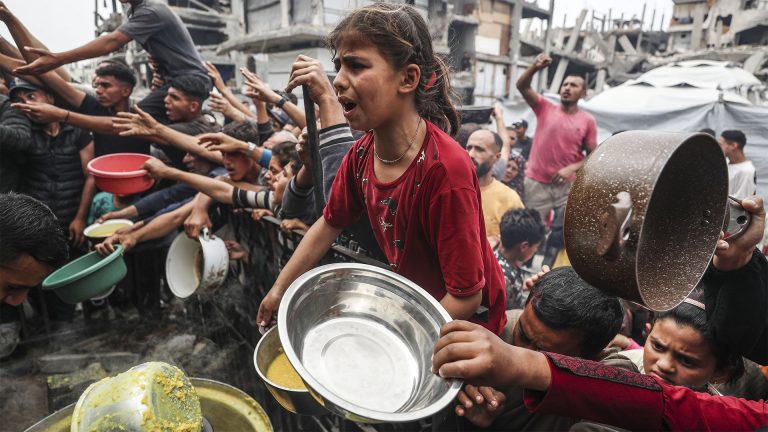
Wherever you stand on Gaza, starving children to death is indefensible
In these febrile and frightening times, I suppose it’s kind of reassuring that the Left can still find time to fall out with itself. Then again, with so many competing yet overlapping interests on full display, this narcissism of small differences is perhaps inevitable. In less time than it takes to say “I didn’t know Tariq Ali was still alive”, I had thrust into my hands a copy of the anarchist magazine Jackdaw, the communist newspapers The Morning Star and Weekly Worker, a flyer for a four-day Marxism festival, and a newsletter for the Socialist Equality Party.
Occasionally, it was a bit like being in a time warp. As was the case on the first protest I ever attended, in support of the miners in Hyde Park in 1992, the Socialist Workers’ Party were doing a brisk line in branded placards. With the pits now closed and even the steelworks in trouble, remarkably, this revolutionary army continues to operate at full tilt. Who among us can’t imagine a future in which the SWP’s production line of cardboard banners becomes the cornerstone of Britain’s manufacturing base?
As I pondered these things, a part of me was beginning to worry that the demo might be slightly more sedate than I’d imagined. In the first half hour all I had for colour, really, was an old guy chanting “Gaza Gaza not for sale, Donald Trump belongs in jail”, a picture of a “Quakers for Peace” banner, and a chat with an artist named Tom who was raising money for a friend in a Gazan refugee camp. Ghadeer is her name. “The price of food is astronomical over there,” he told me. “A bag of flour can be as high as £400.”
I shouldn’t have worried, though. Chatting with a nice lady, I learned that for many people the worst part of the marches were the counter-protestors. Opposite the London Eye, another woman told me the same thing. “Somewhere along this route you will find a small group of people waving Israeli flags, heavily protected and cordoned off,” she told me.
So off I went, speed-walking across bridges and weaving past stewards, in the hope of finding this compliment of counter demonstrators.
As it turned out, the protestors protesting the protest weren’t marching at all; instead, they were guarded by a thick blue line of police officers and cordoned off inside a fortified enclosure at the bottom of the Aldwych. Noisy and relentless, the whole setup seemed designed to exude enmity. Although the cops agreed to let me in, no one wanted to speak to me.
I was a bit intimidated. A piercingly loud PA kept up a relentless dirge of noise, a flutter of national flags swayed above the heads of granite-faced geezers who looked like they might have been familiar with the terraces of Upton Park and the Den in the days before CCTV. “Facking ol’ biw!” one of them shouted. A man wearing a Welsh flag as a kind of cape introduced himself as the head of security. No one seemed very impressed with my press card.
But they were not the only counter-protesters. Wearing sunglasses with lenses the size of dinner plates, at last, an Israeli woman named Elisabetta agreed to speak on the record. “The reason I’m so sad and disappointed is that no one is talking about the hostages… yet here we are talking about Israel bombing, indiscriminately, Palestine,” she said. “But it’s not true. In the history of war, there was no country that put [out] so many warnings that we’re going to bomb you in two days, or in two hours.”
Elisabetta had a friend, Margarita, a Christian who believed that everyone on the march was a Hamas supporter. “I support Israel because Jesus was Jewish and because it’s God’s will that Palestine is their [the Jews’] promised land,” she said. “That’s quite a trenchant position,” I said. “It’s an honest position,” she replied.
Her words reminded me of a passage in the book Blaming The Victims, in which the Jerusalem-born academic Edward Said wrote: “The conflict over Palestine is unusual in many different ways, principally of course because Palestine is not an ordinary place. An almost mythological territory saturated with religious ideology and overwhelming cultural significance, Palestine has been weighed down with historical as well as political meanings for many generations, peoples, and traditions.”
And on it went. Back out on the street, protestors chanted “shame on you!” at the sight of Israeli flags. A marcher carrying a placard that said “peace is a white man’s word: liberation is ours” trundled by. Inside the compound, people waved signs bearing the slogans “we freed Palestine in 1948: Israel 77 years” and “free London from extremism”. Aside from a shared loathing of the BBC – Schrödinger’s broadcaster is both Zionist stooge and Hamas cheerleader – the hardliners were speaking different languages.
The afternoon drew to a close with a series of speeches from a stage on Whitehall. Talking in stilted rhythms to an avowedly home crowd, a five-minute sermon from Jeremy Corbyn garnered the kind of acclaim that greeted The Beatles at Shea Stadium. Ten minutes later, at the same microphone, hearing a young trade unionist making a self-deprecating joke about the difficulties of speaking immediately after the former Labour leader made me wince. Was Corbyn really the best they’d got? Perhaps I was getting a bit salty. Maybe it was time to go home.
For more than five hours I’d kept company with toddlers in strollers, kids in keffiyehs, middle-aged men in Crystal Palace shirts, and pensioners who were alive during the most squalid days of the 20th century. Across a spectrum of ages, accents, nationalities and races, I’d spoken to plenty of people, only a few of whom had given me the creeps. I’d seen a smattering of Islamists, perhaps, and a cohort of hardcore Israelophiles. As hunger began to gnaw, within yards of the prime minister’s bedroom, I’d been offered free vegetarian food and a can of “Gaza Cola”.
After all that, I can say for sure that I hadn’t been on a hate march. All I’d done was spend an afternoon in modern Britain.

